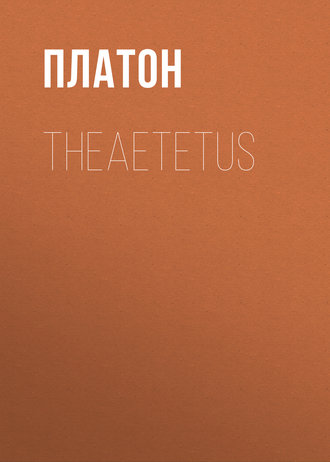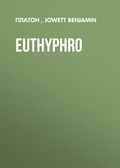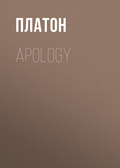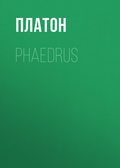
Платон
Theaetetus
THEODORUS: If you could only persuade everybody, Socrates, as you do me, of the truth of your words, there would be more peace and fewer evils among men.
SOCRATES: Evils, Theodorus, can never pass away; for there must always remain something which is antagonistic to good. Having no place among the gods in heaven, of necessity they hover around the mortal nature, and this earthly sphere. Wherefore we ought to fly away from earth to heaven as quickly as we can; and to fly away is to become like God, as far as this is possible; and to become like him, is to become holy, just, and wise. But, O my friend, you cannot easily convince mankind that they should pursue virtue or avoid vice, not merely in order that a man may seem to be good, which is the reason given by the world, and in my judgment is only a repetition of an old wives' fable. Whereas, the truth is that God is never in any way unrighteous – he is perfect righteousness; and he of us who is the most righteous is most like him. Herein is seen the true cleverness of a man, and also his nothingness and want of manhood. For to know this is true wisdom and virtue, and ignorance of this is manifest folly and vice. All other kinds of wisdom or cleverness, which seem only, such as the wisdom of politicians, or the wisdom of the arts, are coarse and vulgar. The unrighteous man, or the sayer and doer of unholy things, had far better not be encouraged in the illusion that his roguery is clever; for men glory in their shame – they fancy that they hear others saying of them, 'These are not mere good-for-nothing persons, mere burdens of the earth, but such as men should be who mean to dwell safely in a state.' Let us tell them that they are all the more truly what they do not think they are because they do not know it; for they do not know the penalty of injustice, which above all things they ought to know – not stripes and death, as they suppose, which evil-doers often escape, but a penalty which cannot be escaped.
THEODORUS: What is that?
SOCRATES: There are two patterns eternally set before them; the one blessed and divine, the other godless and wretched: but they do not see them, or perceive that in their utter folly and infatuation they are growing like the one and unlike the other, by reason of their evil deeds; and the penalty is, that they lead a life answering to the pattern which they are growing like. And if we tell them, that unless they depart from their cunning, the place of innocence will not receive them after death; and that here on earth, they will live ever in the likeness of their own evil selves, and with evil friends – when they hear this they in their superior cunning will seem to be listening to the talk of idiots.
THEODORUS: Very true, Socrates.
SOCRATES: Too true, my friend, as I well know; there is, however, one peculiarity in their case: when they begin to reason in private about their dislike of philosophy, if they have the courage to hear the argument out, and do not run away, they grow at last strangely discontented with themselves; their rhetoric fades away, and they become helpless as children. These however are digressions from which we must now desist, or they will overflow, and drown the original argument; to which, if you please, we will now return.
THEODORUS: For my part, Socrates, I would rather have the digressions, for at my age I find them easier to follow; but if you wish, let us go back to the argument.
SOCRATES: Had we not reached the point at which the partisans of the perpetual flux, who say that things are as they seem to each one, were confidently maintaining that the ordinances which the state commanded and thought just, were just to the state which imposed them, while they were in force; this was especially asserted of justice; but as to the good, no one had any longer the hardihood to contend of any ordinances which the state thought and enacted to be good that these, while they were in force, were really good; – he who said so would be playing with the name 'good,' and would not touch the real question – it would be a mockery, would it not?
THEODORUS: Certainly it would.
SOCRATES: He ought not to speak of the name, but of the thing which is contemplated under the name.
THEODORUS: Right.
SOCRATES: Whatever be the term used, the good or expedient is the aim of legislation, and as far as she has an opinion, the state imposes all laws with a view to the greatest expediency; can legislation have any other aim?
THEODORUS: Certainly not.
SOCRATES: But is the aim attained always? do not mistakes often happen?
THEODORUS: Yes, I think that there are mistakes.
SOCRATES: The possibility of error will be more distinctly recognised, if we put the question in reference to the whole class under which the good or expedient falls. That whole class has to do with the future, and laws are passed under the idea that they will be useful in after-time; which, in other words, is the future.
THEODORUS: Very true.
SOCRATES: Suppose now, that we ask Protagoras, or one of his disciples, a question: – O, Protagoras, we will say to him, Man is, as you declare, the measure of all things – white, heavy, light: of all such things he is the judge; for he has the criterion of them in himself, and when he thinks that things are such as he experiences them to be, he thinks what is and is true to himself. Is it not so?
THEODORUS: Yes.
SOCRATES: And do you extend your doctrine, Protagoras (as we shall further say), to the future as well as to the present; and has he the criterion not only of what in his opinion is but of what will be, and do things always happen to him as he expected? For example, take the case of heat: – When an ordinary man thinks that he is going to have a fever, and that this kind of heat is coming on, and another person, who is a physician, thinks the contrary, whose opinion is likely to prove right? Or are they both right? – he will have a heat and fever in his own judgment, and not have a fever in the physician's judgment?
THEODORUS: How ludicrous!
SOCRATES: And the vinegrower, if I am not mistaken, is a better judge of the sweetness or dryness of the vintage which is not yet gathered than the harp-player?
THEODORUS: Certainly.
SOCRATES: And in musical composition the musician will know better than the training master what the training master himself will hereafter think harmonious or the reverse?
THEODORUS: Of course.
SOCRATES: And the cook will be a better judge than the guest, who is not a cook, of the pleasure to be derived from the dinner which is in preparation; for of present or past pleasure we are not as yet arguing; but can we say that every one will be to himself the best judge of the pleasure which will seem to be and will be to him in the future? – nay, would not you, Protagoras, better guess which arguments in a court would convince any one of us than the ordinary man?
THEODORUS: Certainly, Socrates, he used to profess in the strongest manner that he was the superior of all men in this respect.
SOCRATES: To be sure, friend: who would have paid a large sum for the privilege of talking to him, if he had really persuaded his visitors that neither a prophet nor any other man was better able to judge what will be and seem to be in the future than every one could for himself?
THEODORUS: Who indeed?
SOCRATES: And legislation and expediency are all concerned with the future; and every one will admit that states, in passing laws, must often fail of their highest interests?
THEODORUS: Quite true.
SOCRATES: Then we may fairly argue against your master, that he must admit one man to be wiser than another, and that the wiser is a measure: but I, who know nothing, am not at all obliged to accept the honour which the advocate of Protagoras was just now forcing upon me, whether I would or not, of being a measure of anything.
THEODORUS: That is the best refutation of him, Socrates; although he is also caught when he ascribes truth to the opinions of others, who give the lie direct to his own opinion.
SOCRATES: There are many ways, Theodorus, in which the doctrine that every opinion of every man is true may be refuted; but there is more difficulty in proving that states of feeling, which are present to a man, and out of which arise sensations and opinions in accordance with them, are also untrue. And very likely I have been talking nonsense about them; for they may be unassailable, and those who say that there is clear evidence of them, and that they are matters of knowledge, may probably be right; in which case our friend Theaetetus was not so far from the mark when he identified perception and knowledge. And therefore let us draw nearer, as the advocate of Protagoras desires; and give the truth of the universal flux a ring: is the theory sound or not? at any rate, no small war is raging about it, and there are combination not a few.
THEODORUS: No small, war, indeed, for in Ionia the sect makes rapid strides; the disciples of Heracleitus are most energetic upholders of the doctrine.
SOCRATES: Then we are the more bound, my dear Theodorus, to examine the question from the foundation as it is set forth by themselves.
THEODORUS: Certainly we are. About these speculations of Heracleitus, which, as you say, are as old as Homer, or even older still, the Ephesians themselves, who profess to know them, are downright mad, and you cannot talk with them on the subject. For, in accordance with their text-books, they are always in motion; but as for dwelling upon an argument or a question, and quietly asking and answering in turn, they can no more do so than they can fly; or rather, the determination of these fellows not to have a particle of rest in them is more than the utmost powers of negation can express. If you ask any of them a question, he will produce, as from a quiver, sayings brief and dark, and shoot them at you; and if you inquire the reason of what he has said, you will be hit by some other new-fangled word, and will make no way with any of them, nor they with one another; their great care is, not to allow of any settled principle either in their arguments or in their minds, conceiving, as I imagine, that any such principle would be stationary; for they are at war with the stationary, and do what they can to drive it out everywhere.
SOCRATES: I suppose, Theodorus, that you have only seen them when they were fighting, and have never stayed with them in time of peace, for they are no friends of yours; and their peace doctrines are only communicated by them at leisure, as I imagine, to those disciples of theirs whom they want to make like themselves.
THEODORUS: Disciples! my good sir, they have none; men of their sort are not one another's disciples, but they grow up at their own sweet will, and get their inspiration anywhere, each of them saying of his neighbour that he knows nothing. From these men, then, as I was going to remark, you will never get a reason, whether with their will or without their will; we must take the question out of their hands, and make the analysis ourselves, as if we were doing geometrical problem.
SOCRATES: Quite right too; but as touching the aforesaid problem, have we not heard from the ancients, who concealed their wisdom from the many in poetical figures, that Oceanus and Tethys, the origin of all things, are streams, and that nothing is at rest? And now the moderns, in their superior wisdom, have declared the same openly, that the cobbler too may hear and learn of them, and no longer foolishly imagine that some things are at rest and others in motion – having learned that all is motion, he will duly honour his teachers. I had almost forgotten the opposite doctrine, Theodorus,
'Alone Being remains unmoved, which is the name for the all.'
This is the language of Parmenides, Melissus, and their followers, who stoutly maintain that all being is one and self-contained, and has no place in which to move. What shall we do, friend, with all these people; for, advancing step by step, we have imperceptibly got between the combatants, and, unless we can protect our retreat, we shall pay the penalty of our rashness – like the players in the palaestra who are caught upon the line, and are dragged different ways by the two parties. Therefore I think that we had better begin by considering those whom we first accosted, 'the river-gods,' and, if we find any truth in them, we will help them to pull us over, and try to get away from the others. But if the partisans of 'the whole' appear to speak more truly, we will fly off from the party which would move the immovable, to them. And if I find that neither of them have anything reasonable to say, we shall be in a ridiculous position, having so great a conceit of our own poor opinion and rejecting that of ancient and famous men. O Theodorus, do you think that there is any use in proceeding when the danger is so great?
THEODORUS: Nay, Socrates, not to examine thoroughly what the two parties have to say would be quite intolerable.
SOCRATES: Then examine we must, since you, who were so reluctant to begin, are so eager to proceed. The nature of motion appears to be the question with which we begin. What do they mean when they say that all things are in motion? Is there only one kind of motion, or, as I rather incline to think, two? I should like to have your opinion upon this point in addition to my own, that I may err, if I must err, in your company; tell me, then, when a thing changes from one place to another, or goes round in the same place, is not that what is called motion?
THEODORUS: Yes.
SOCRATES: Here then we have one kind of motion. But when a thing, remaining on the same spot, grows old, or becomes black from being white, or hard from being soft, or undergoes any other change, may not this be properly called motion of another kind?
THEODORUS: I think so.
SOCRATES: Say rather that it must be so. Of motion then there are these two kinds, 'change,' and 'motion in place.'
THEODORUS: You are right.
SOCRATES: And now, having made this distinction, let us address ourselves to those who say that all is motion, and ask them whether all things according to them have the two kinds of motion, and are changed as well as move in place, or is one thing moved in both ways, and another in one only?
THEODORUS: Indeed, I do not know what to answer; but I think they would say that all things are moved in both ways.
SOCRATES: Yes, comrade; for, if not, they would have to say that the same things are in motion and at rest, and there would be no more truth in saying that all things are in motion, than that all things are at rest.
THEODORUS: To be sure.
SOCRATES: And if they are to be in motion, and nothing is to be devoid of motion, all things must always have every sort of motion?
THEODORUS: Most true.
SOCRATES: Consider a further point: did we not understand them to explain the generation of heat, whiteness, or anything else, in some such manner as the following: – were they not saying that each of them is moving between the agent and the patient, together with a perception, and that the patient ceases to be a perceiving power and becomes a percipient, and the agent a quale instead of a quality? I suspect that quality may appear a strange and uncouth term to you, and that you do not understand the abstract expression. Then I will take concrete instances: I mean to say that the producing power or agent becomes neither heat nor whiteness but hot and white, and the like of other things. For I must repeat what I said before, that neither the agent nor patient have any absolute existence, but when they come together and generate sensations and their objects, the one becomes a thing of a certain quality, and the other a percipient. You remember?
THEODORUS: Of course.
SOCRATES: We may leave the details of their theory unexamined, but we must not forget to ask them the only question with which we are concerned: Are all things in motion and flux?
THEODORUS: Yes, they will reply.
SOCRATES: And they are moved in both those ways which we distinguished, that is to say, they move in place and are also changed?
THEODORUS: Of course, if the motion is to be perfect.
SOCRATES: If they only moved in place and were not changed, we should be able to say what is the nature of the things which are in motion and flux?
THEODORUS: Exactly.
SOCRATES: But now, since not even white continues to flow white, and whiteness itself is a flux or change which is passing into another colour, and is never to be caught standing still, can the name of any colour be rightly used at all?
THEODORUS: How is that possible, Socrates, either in the case of this or of any other quality – if while we are using the word the object is escaping in the flux?
SOCRATES: And what would you say of perceptions, such as sight and hearing, or any other kind of perception? Is there any stopping in the act of seeing and hearing?
THEODORUS: Certainly not, if all things are in motion.
SOCRATES: Then we must not speak of seeing any more than of not-seeing, nor of any other perception more than of any non-perception, if all things partake of every kind of motion?
THEODORUS: Certainly not.
SOCRATES: Yet perception is knowledge: so at least Theaetetus and I were saying.
THEODORUS: Very true.
SOCRATES: Then when we were asked what is knowledge, we no more answered what is knowledge than what is not knowledge?
THEODORUS: I suppose not.
SOCRATES: Here, then, is a fine result: we corrected our first answer in our eagerness to prove that nothing is at rest. But if nothing is at rest, every answer upon whatever subject is equally right: you may say that a thing is or is not thus; or, if you prefer, 'becomes' thus; and if we say 'becomes,' we shall not then hamper them with words expressive of rest.
THEODORUS: Quite true.
SOCRATES: Yes, Theodorus, except in saying 'thus' and 'not thus.' But you ought not to use the word 'thus,' for there is no motion in 'thus' or in 'not thus.' The maintainers of the doctrine have as yet no words in which to express themselves, and must get a new language. I know of no word that will suit them, except perhaps 'no how,' which is perfectly indefinite.
THEODORUS: Yes, that is a manner of speaking in which they will be quite at home.
SOCRATES: And so, Theodorus, we have got rid of your friend without assenting to his doctrine, that every man is the measure of all things – a wise man only is a measure; neither can we allow that knowledge is perception, certainly not on the hypothesis of a perpetual flux, unless perchance our friend Theaetetus is able to convince us that it is.
THEODORUS: Very good, Socrates; and now that the argument about the doctrine of Protagoras has been completed, I am absolved from answering; for this was the agreement.
THEAETETUS: Not, Theodorus, until you and Socrates have discussed the doctrine of those who say that all things are at rest, as you were proposing.
THEODORUS: You, Theaetetus, who are a young rogue, must not instigate your elders to a breach of faith, but should prepare to answer Socrates in the remainder of the argument.
THEAETETUS: Yes, if he wishes; but I would rather have heard about the doctrine of rest.
THEODORUS: Invite Socrates to an argument – invite horsemen to the open plain; do but ask him, and he will answer.
SOCRATES: Nevertheless, Theodorus, I am afraid that I shall not be able to comply with the request of Theaetetus.
THEODORUS: Not comply! for what reason?
SOCRATES: My reason is that I have a kind of reverence; not so much for Melissus and the others, who say that 'All is one and at rest,' as for the great leader himself, Parmenides, venerable and awful, as in Homeric language he may be called; – him I should be ashamed to approach in a spirit unworthy of him. I met him when he was an old man, and I was a mere youth, and he appeared to me to have a glorious depth of mind. And I am afraid that we may not understand his words, and may be still further from understanding his meaning; above all I fear that the nature of knowledge, which is the main subject of our discussion, may be thrust out of sight by the unbidden guests who will come pouring in upon our feast of discourse, if we let them in – besides, the question which is now stirring is of immense extent, and will be treated unfairly if only considered by the way; or if treated adequately and at length, will put into the shade the other question of knowledge. Neither the one nor the other can be allowed; but I must try by my art of midwifery to deliver Theaetetus of his conceptions about knowledge.
THEAETETUS: Very well; do so if you will.
SOCRATES: Then now, Theaetetus, take another view of the subject: you answered that knowledge is perception?
THEAETETUS: I did.
SOCRATES: And if any one were to ask you: With what does a man see black and white colours? and with what does he hear high and low sounds? – you would say, if I am not mistaken, 'With the eyes and with the ears.'
THEAETETUS: I should.
SOCRATES: The free use of words and phrases, rather than minute precision, is generally characteristic of a liberal education, and the opposite is pedantic; but sometimes precision is necessary, and I believe that the answer which you have just given is open to the charge of incorrectness; for which is more correct, to say that we see or hear with the eyes and with the ears, or through the eyes and through the ears.
THEAETETUS: I should say 'through,' Socrates, rather than 'with.'
SOCRATES: Yes, my boy, for no one can suppose that in each of us, as in a sort of Trojan horse, there are perched a number of unconnected senses, which do not all meet in some one nature, the mind, or whatever we please to call it, of which they are the instruments, and with which through them we perceive objects of sense.
THEAETETUS: I agree with you in that opinion.
SOCRATES: The reason why I am thus precise is, because I want to know whether, when we perceive black and white through the eyes, and again, other qualities through other organs, we do not perceive them with one and the same part of ourselves, and, if you were asked, you might refer all such perceptions to the body. Perhaps, however, I had better allow you to answer for yourself and not interfere. Tell me, then, are not the organs through which you perceive warm and hard and light and sweet, organs of the body?
THEAETETUS: Of the body, certainly.
SOCRATES: And you would admit that what you perceive through one faculty you cannot perceive through another; the objects of hearing, for example, cannot be perceived through sight, or the objects of sight through hearing?
THEAETETUS: Of course not.
SOCRATES: If you have any thought about both of them, this common perception cannot come to you, either through the one or the other organ?
THEAETETUS: It cannot.
SOCRATES: How about sounds and colours: in the first place you would admit that they both exist?
THEAETETUS: Yes.
SOCRATES: And that either of them is different from the other, and the same with itself?
THEAETETUS: Certainly.
SOCRATES: And that both are two and each of them one?
THEAETETUS: Yes.
SOCRATES: You can further observe whether they are like or unlike one another?
THEAETETUS: I dare say.
SOCRATES: But through what do you perceive all this about them? for neither through hearing nor yet through seeing can you apprehend that which they have in common. Let me give you an illustration of the point at issue: – If there were any meaning in asking whether sounds and colours are saline or not, you would be able to tell me what faculty would consider the question. It would not be sight or hearing, but some other.
THEAETETUS: Certainly; the faculty of taste.
SOCRATES: Very good; and now tell me what is the power which discerns, not only in sensible objects, but in all things, universal notions, such as those which are called being and not-being, and those others about which we were just asking – what organs will you assign for the perception of these notions?
THEAETETUS: You are thinking of being and not being, likeness and unlikeness, sameness and difference, and also of unity and other numbers which are applied to objects of sense; and you mean to ask, through what bodily organ the soul perceives odd and even numbers and other arithmetical conceptions.
SOCRATES: You follow me excellently, Theaetetus; that is precisely what I am asking.
THEAETETUS: Indeed, Socrates, I cannot answer; my only notion is, that these, unlike objects of sense, have no separate organ, but that the mind, by a power of her own, contemplates the universals in all things.
SOCRATES: You are a beauty, Theaetetus, and not ugly, as Theodorus was saying; for he who utters the beautiful is himself beautiful and good. And besides being beautiful, you have done me a kindness in releasing me from a very long discussion, if you are clear that the soul views some things by herself and others through the bodily organs. For that was my own opinion, and I wanted you to agree with me.
THEAETETUS: I am quite clear.
SOCRATES: And to which class would you refer being or essence; for this, of all our notions, is the most universal?
THEAETETUS: I should say, to that class which the soul aspires to know of herself.
SOCRATES: And would you say this also of like and unlike, same and other?
THEAETETUS: Yes.
SOCRATES: And would you say the same of the noble and base, and of good and evil?
THEAETETUS: These I conceive to be notions which are essentially relative, and which the soul also perceives by comparing in herself things past and present with the future.
SOCRATES: And does she not perceive the hardness of that which is hard by the touch, and the softness of that which is soft equally by the touch?
THEAETETUS: Yes.
SOCRATES: But their essence and what they are, and their opposition to one another, and the essential nature of this opposition, the soul herself endeavours to decide for us by the review and comparison of them?
THEAETETUS: Certainly.
SOCRATES: The simple sensations which reach the soul through the body are given at birth to men and animals by nature, but their reflections on the being and use of them are slowly and hardly gained, if they are ever gained, by education and long experience.
THEAETETUS: Assuredly.
SOCRATES: And can a man attain truth who fails of attaining being?
THEAETETUS: Impossible.
SOCRATES: And can he who misses the truth of anything, have a knowledge of that thing?
THEAETETUS: He cannot.
SOCRATES: Then knowledge does not consist in impressions of sense, but in reasoning about them; in that only, and not in the mere impression, truth and being can be attained?
THEAETETUS: Clearly.
SOCRATES: And would you call the two processes by the same name, when there is so great a difference between them?
THEAETETUS: That would certainly not be right.
SOCRATES: And what name would you give to seeing, hearing, smelling, being cold and being hot?
THEAETETUS: I should call all of them perceiving – what other name could be given to them?
SOCRATES: Perception would be the collective name of them?
THEAETETUS: Certainly.
SOCRATES: Which, as we say, has no part in the attainment of truth any more than of being?
THEAETETUS: Certainly not.
SOCRATES: And therefore not in science or knowledge?
THEAETETUS: No.
SOCRATES: Then perception, Theaetetus, can never be the same as knowledge or science?
THEAETETUS: Clearly not, Socrates; and knowledge has now been most distinctly proved to be different from perception.
SOCRATES: But the original aim of our discussion was to find out rather what knowledge is than what it is not; at the same time we have made some progress, for we no longer seek for knowledge in perception at all, but in that other process, however called, in which the mind is alone and engaged with being.
THEAETETUS: You mean, Socrates, if I am not mistaken, what is called thinking or opining.
SOCRATES: You conceive truly. And now, my friend, please to begin again at this point; and having wiped out of your memory all that has preceded, see if you have arrived at any clearer view, and once more say what is knowledge.
THEAETETUS: I cannot say, Socrates, that all opinion is knowledge, because there may be a false opinion; but I will venture to assert, that knowledge is true opinion: let this then be my reply; and if this is hereafter disproved, I must try to find another.
SOCRATES: That is the way in which you ought to answer, Theaetetus, and not in your former hesitating strain, for if we are bold we shall gain one of two advantages; either we shall find what we seek, or we shall be less likely to think that we know what we do not know – in either case we shall be richly rewarded. And now, what are you saying? – Are there two sorts of opinion, one true and the other false; and do you define knowledge to be the true?
THEAETETUS: Yes, according to my present view.
SOCRATES: Is it still worth our while to resume the discussion touching opinion?
THEAETETUS: To what are you alluding?
SOCRATES: There is a point which often troubles me, and is a great perplexity to me, both in regard to myself and others. I cannot make out the nature or origin of the mental experience to which I refer.
THEAETETUS: Pray what is it?
SOCRATES: How there can be false opinion – that difficulty still troubles the eye of my mind; and I am uncertain whether I shall leave the question, or begin over again in a new way.
THEAETETUS: Begin again, Socrates, – at least if you think that there is the slightest necessity for doing so. Were not you and Theodorus just now remarking very truly, that in discussions of this kind we may take our own time?
SOCRATES: You are quite right, and perhaps there will be no harm in retracing our steps and beginning again. Better a little which is well done, than a great deal imperfectly.
THEAETETUS: Certainly.
SOCRATES: Well, and what is the difficulty? Do we not speak of false opinion, and say that one man holds a false and another a true opinion, as though there were some natural distinction between them?







